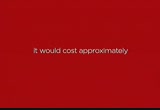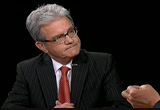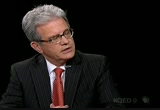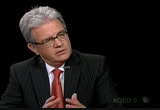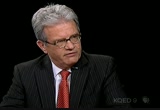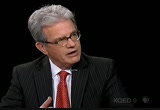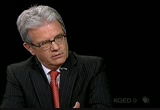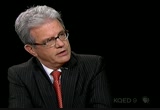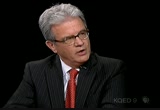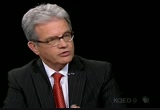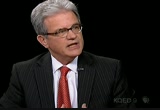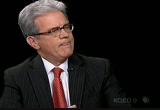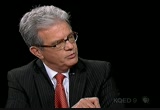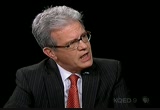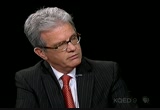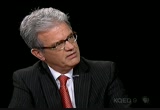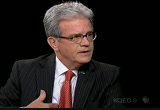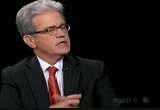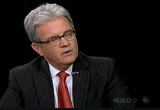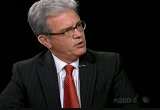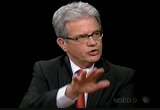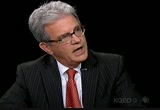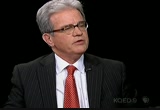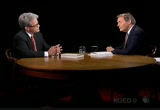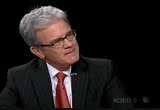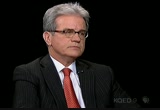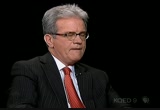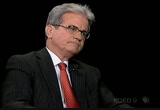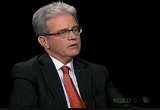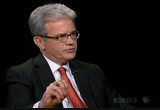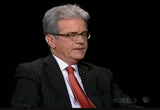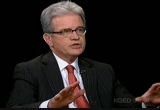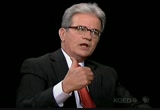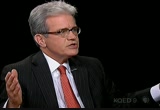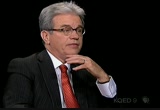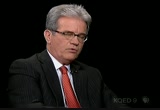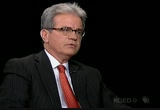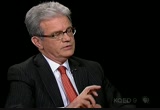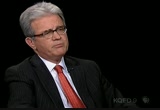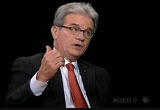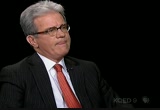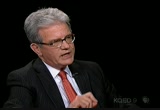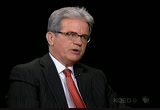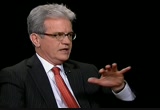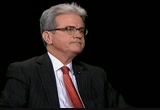tv Charlie Rose PBS May 2, 2012 12:00pm-1:00pm PDT
12:00 pm
>> rose: welcome to our program. tonight, we continue our look at the american economy with tom coburn, republican senator from oklahoma. >> what we lack in our country today is we have got a great country. we lack confidence about the future. i have never seen anxiety higher than our country in my whole 64 years. i have never seen it. and i have been a national, on the national scene all that long but i have been out there in both business and in medicine and everything else. i have never seen people with so limit confidence in our country, and i blame that on both parties, it is because we are not thinking long-term. we are not modeling the behavior that gives people confidence. and confidence is the key from coming out of recessions. >> rose: tom coburn for the hour. next. funding for charlie rose was provided by the following.
12:02 pm
from our studios in new york city, this is charlie rose. >> dr. tom coburn is here, sea republican senator from oklahoma, he was a member of the gang of six, a bipartisan group focused on reducing the deficit and part of president obama's deficit reduction committee and known for being a fiscal and social conservative he unveiled a proposal that would reduce the deficit by $9 trillion, cutting everything from discretionary and mandatory spending to tax reform. he talked about our fiscal imbalances and how to balance them. it is called the debt bomb. i am proud to have tom coburn at this table, with many discussions while he was in washington and i was in new york. >> thank you, charlie. >> rose: i should say several things about you as we begin and many people who do what i do understand this. what is interesting about you is one, a medical doctor, also,
12:03 pm
unique about you, i mean you have been strongly, strong passionate feelings about abortion, reflected in what you have said and how you have positioned -- positions you have taken, thirdly, you are close to, reasonably close for a republican senator to the president. >> uh-huh. >> rose: you have a relationship, a conversation. what is it about, the conversation? >> oh, it is everything from family or when he is getting a hard time that i think is undue i will call him and encourage him, you know., you know, he is just a friend, you know, and i think it is a great example, you can be polar opposites in terms of your political philosophy but you can have great relationships. >> rose: then why doesn't it happen more often? >> well, because i am not looking to get re-elected and i am not looking to gain anything from it. i don't think he is really looking to gain anything from his relationship with me. we are association, our association came as we came into the senate together and we just
12:04 pm
like each other. and there is no secondary motivations for us, and so -- >> rose: it is not political? >> we disagree -- >> rose: no, no, the relationship not political, it is personal, regardless of position? >> and besides that, he is a good basketball player. >> rose: and you? >> no. i am not. >> rose: have you been on the court with him? >> no, i have not and will not. >> rose: you don't want to? >> i don't want to get hurt. >> rose: so how do you see what the great debate of this election ought to be between democrats and republicans? >> what it ought to be? >> rose: what it ought to be and what it might be. >> it ought to be the same debate and the thing we are missing in our country today is nobody is talking about the real problems. what the debate ought to be is we ought to come together and identify what the real problems are, and privately everyone will tell you the same thing, they all know what the real problems are. the debate ought to be is what
12:05 pm
are the solutions to those problems, rather than, ducking and denying that the real problems are imminent and urgent for our country. >> rose: boehner has a conversation with -- and he said to me that since the menu, the menu when they were having serious negotiations with the president, and he said he was prepared to act on the revenue side, if, in fact he could get the president to act on the spending side, and he said it failed in the end because the president went back and he did more revenue. is that your ascertainment of that? >> i am not privy to any of the conversations between the president and the speaker, unfortunately, what we didn't get was compromise when we should have. >> rose: without pointing the finger to either side? >> i wasn't there, and nobody was there. >> rose: do you remember the gang of six? >> sure, i remember the gang of six and we worked hard, we had tough battles.
12:06 pm
and in terms of how we came together, but even that was utilized in a way to not end up in the long run not getting compromised -- >> rose: simpson-bowles commission. >> you bet. you know, my position is, i think these problems are so great for our country i am willing to move a long ways from my political positions for, first to have the debate, two to have the legislation so we solve the problems, even if i don't get the majority of what i want that is how serious it is. there is not going to be 60 tom coburns in the senate, it isn't going to happen, so what i have to realize is, what is at risk for our country? and if you think about it, i mean, it is fundamental, if you are a college student today, one in two can't get a job or remarkably unemployed that will move, one out of two, three, four, or 5, if we don't solve this account in a account, that
12:07 pm
ira account won't go anywhere near resolving your retirement means because we will have inflation to debase the purchasing value of what we have in your account, you know, if you want your grandchildren to be able to go to college, that is going to be an impossibility if things unwind, if we don't act, and so it is not -- people can say, you know, i was asked about the secretary geithner disputing what i say in this book about our risk of becoming greece, but what everybody has to understand, he can't, he can't agree publicly with me on that issue. >> rose: because what he says has an impact on the psychology -- >> of the markets. >> he says, yeah that is right, guess what happens to our bonds tomorrow? he can't agree with me. but he also said we are not going to have a debt downgrade and three weeks later we have a debt downgrade, we will have another debt downgrade because nobody is leading in washington to solve the problems. >> rose: and when we got the last debt downgrade, credit or
12:08 pm
debt from standard & poors they cited political inaction. >> right. >> rose: as the principal reason. >> right. so what has happened since then? >> rose: nothing. >> that's right. and so what -- we have all of these -- as a doctor i am trained to look at disease, and the political arena the disease is all the symptoms we see out there of unsustainable medicare, unsustainable -- what is the problem? the problem is lack of leadership. and long-term view of what is best for our country. >> rose: lack of leadership in the executive branch? >> both sides. >> rose: and the legislative branch? >> both sides we ought to be bending over backwards with this president so solve this problem before the election, you know, if we think about what could happen to us, if you look at what is happening, in europe and what is going to happen in japan and a lot of people haven't focused on -- >> rose: just tell us what is happening as you see it in europe and what is going to happen in japan.
12:09 pm
>> they can't deleverage their debt. >> rose: in europe? >> in europe, and their us aer ty programs started too late, which makes the point of paul krugman if you don't have any growth and you have austerity -- >> rose:. >> you are going to be in a downward spiral. well, they are in a downward spiral and all we have done with the ltros and all of these other machinations of trying to pump up the euro is bought some time. but the end result is going to be the same. >> rose: and time is coming in terms of december and jab? >> yeah. >> rose: but let me stay with what pull krugman said he was here last night and what he would immediately do is have states, states and municipalities hire teachers, and police people. >> that is not the answer. the answer is let the market shake out the deleveraging and make sure that we create an incentive, i believe, the answer is to create an incentive. >> rose: to take out the deleveraginging, what does that mean? >> well, we are at 100 percent
12:10 pm
debt to gdp, we are in a debt crisis, deleveraging -- >> rose: 100 percent? i thought it was about 75? >> no, 90 percent pure but if you consider -- and if you look at rudolph and reinhard what they say is you have to consider gross debt, we are over 100 percent. >> rose: the objective is to get it to 75? >> the objective is actually to 60. >> rose: right. >> to where it is sustainable. but if, in fact, we delever, which deleveraging takes on average eight to 12 yowrz years and into our fourth year on this, how do you keep things going? what we have to do is to keep the confidence of the international financial community that we are going to work our way out of it, and what we don't want to do is ever send a signal to the bond entities throughout the world that we are past the tipping point, and how do you do that? well, you can do it like sweden did it where they cut taxes but they also cut spending, so the neck effect on their economy from the reduction in government spending. >> rose: because they were
12:11 pm
spending less? >> right. and so it was offset, but what happens is, we have got over $2 trillion sitting on the sideline in our country that is not being invested, and that is because people don't have any confidence in the future. >> rose: so if you show them some confidence, they would be prepared to make investments and hire people -- >> you bet. and most of the very wealthy in this country will gladly go along with paying a whole lot more taxes if they think it is going to solve the problem. >> rose: how do you create consumer demand? >> you create consumer demand by cutting taxes and increasing the value of money in people's pocket. i just read an interesting article where what is happening now, consumer spending is up faster than what consumer income is up, right? which means ultimately you are going to have debt, but the reason that it is not really adding to consumer debt right now is we have so many people sitting in homes they own that they quit making payments on they are not making the mortgage payments so they have disposable income, well we are in this hole and i am sure
12:12 pm
there are lots of ways to get out of it. >> rose: they are not making payments because the home is underwater. >> right. but they are not out of the place and they are kind of a renter in residence but not making payments so there is an extra disposable income, there are a lot of ways for us to get out of it, but what is happening in our country is we have not -- a and the reason i wrote this book i want the average american to see how we got where we are and i am not saying i am all right in the book, but i am saying here are some solutions for us to get out of it. >> rose: i you are saying before you have solutions you have to understand how we got where we are and the reason we got how we are is we live beyond our means. >> that's right we lived the last 30 years in this country off the next 30 and the bill is due. >> rose: so when you talk about $9 trillion. >> uh-huh. >> -- over ten years, where does it come from? >> it is not hard. if, in fact, you -- everywhere i have gone. >> rose: military ba base, simpson-bowles suggested four and a half. >> that is because they are trying to build a consensus, i am suggesting what i have seen, i have done more oversight in
12:13 pm
the senate more than any senator in the last 50 years, i have looked -- >> rose: let it be noted everybody looks at simpson-bowles in part and we don't need four and a half trillion we need 9 trillion over ten years? >> right. if everybody looks at bowls simpson, everybody agrees four and a half trillion .. is just enough to send a signal to finish time doing it so if we got four and a half trillion dollars by bowls simpson in the next four and a half years we will need another four and a half trillion if we want to get out of the hole so we take a trillion-dollar out of the pentagon and people say, oh and i am a hawk, i am a defense hawk, but everywhere i have been, every military man i have talked to or woman, say, if you had to, tomorrow, could you get ten to fifteen percent out of your budget? there isn't one that hasn't told me yes. >> rose: would leon panetta tell you that? >> well,. >> rose: ten to fifteen percent? >> privately he might, the point is, they don't know, you realize we don't even have financial statement of the pentagon? they
12:14 pm
can't even get an audited financial statement? they don't even know how many programs they have got. they don't know where they are. they don't know whether they paid the bill or not paid the bill. >> rose: you take 20 percent out out of the pentagon budget. >> 15 percent. >> rose: 15 percent how much will that give you over ten years. >> a trillion-dollar. >> so now we are down to eight, where do you find the rest? >> you reform, cut go and a half trillion from discretionary spending. >> rose: it is not that much. >> it has doubled. if we doubled the size -- >> rose: what is the. >> we doubled the size of the federal government over the last ten years in this country. and when people hear that, they can't believe it. >> rose: does it come from discretionary spending? >> it is both. the biggest problems are entitlements if you look at any pie, discretionary spending is not a large part of that pie. >> to the it is 600 billion oute of the pentagon, outside of the pentagon, there you go. that is still 600 billion, if you cut that, 20 percent, you get 1.25 trillion. >> and what happens if you cut,
12:15 pm
this is my point, what happened to that, what happens to that amount out of discretionary spending? who suffers because of that? >> nobody. nobody, let me give you some examples, we have 47 job training programs, spent almost $19 billion a year, none of them worked, all of them duplicate each other except for three, and we are thinking about adding more. why would you have 47 job training programs? we have 209 programs to emphasize -- >> in. >> rose: are you saying you cut them down and have one big job program? >> no, have two or three. >> rose: two or three -- >> >> rose: it is clear think one of the things we need to do is create workers so they have the skills to get jobs that are -- >> that's right and we are spending $18 billion a year now not doing that. there is not a metric out there that says we are successful. not on any one of those programs. none of them. so the question is, what everybody assumes about the federal government is right, we have no idea what we are doing,
12:16 pm
and any time something pops up, we create another program rather than looking -- >> rose: so when you say this in a conversation with the president, what does he say to you. >> i have had those conversations with him, but -- >> well, because why not? his time is his time and it is his priority, if he wants to ask -- >> rose: i got you. >> my relationship is as a personal friend of his. when he wants to talk about those things i will be happy to talk to him. but i do know they keep asking, why does coburn always find out this stuff and we don't know it, in other words -- >> rose: you are saying the administration says that somehow come coburn knows about defense spending and we don't? >> yeah, how comes he knows all of these nuts and nooks and crannies and all of this waste and duplication? i mean, think about, here is medicare, prime programs for our seniors. >> rose: yes. >> if you look at it in terms of improper payments and fraud, it is $100 billion a year. so cut two-third of that, you
12:17 pm
saved a trillion-dollar in medicare before you even touch the program. >> rose: a trillion out of medicare? >> just on fraud. >> rose:. >> just on fraud. >> rose: all right. >> you have two and a half. >> rose: it has nothing to do with the fact nobody will be denied their own medicare payments if they are sick? >> , no here is the situation. >> rose: you are not going to change the -- >> i do think we have to change it. if you want to make it he healthy in the long-term, i am a baby boomer we are justin now starting to receive the baby boomers into medicare, it is unsustainable. >> rose: the ryan budget says what? >> it is a much longer approach of this than i do. >> rose: right. >> i am not afraid to say, you know, we have to, we have to have a means test on medicare. the very wealthy are going to have to pay more of their share. >> rose: so if you are at a certain level, if if you are wealthy no matter what you contributed no matter the fact you have been entitled to medicare if you are wealthy because of the means test you will not receive medical care?
12:18 pm
>> you will receive it but you will pay a higher percentage for what you get. remember, here is something that most people don't realize, the average working couple puts in 110,000 into medicare. they take out $350,000. they put in 100 and take out 300, essentially. how long do you think that can last with the 12 to 15 million that are going to go in, in the next -- >> rose: what nation does best with that? >> switzerlander land does best. >> how do they do it? >> well, they have a private insurance market, and they have a certain minimum that is sub situate died be at this government in terms of the base care but then everybody else buys their own private insurance and they -- that real indicate capital of the insurance company if they are cherry picking they have a market force that is actually disciplined when you look at healthcare in our country, one in $3, $850 billion a year that we spend on healthcare doesn't help anybody
12:19 pm
get well, doesn't keep them from getting sick. we don't have a good system. and i applaud them for wanting to fix it. what we just did with the affordable care act was actually make it worse. >> rose: and anything you can do about the amount of expense and costs of medicare that is spent in the last six months of life? >> sure you can. if you reconnect that to personal payment what we have done is disconnect -- everybody in this country that has insurance, medicare and medicaid they think somebody else is paying the bill and what we do know if you are spending somebody else's money on you, you spend it different than if you think you are spending your own money on you, so we have no force of consumer -- i have i use the example of the amish, i delivered 400 amish babies, none of these people have college education and very bright people. >> rose: the amish community. there is a is an amish community in northeastern oklahoma, when they come to see me as a physician, they are fully loaded to make sure they get value. >> rose: what does that mean
12:20 pm
fully loaded. >> that means they ask questions, they want to know why we are doing something, they want to know where they can get it done cheaper, they want to know what happens if we don't do this, in other words, they are fully engaged purchaser of their healthcare and the reason is, they pay the bill, they don't think somebody else is paying their bill and we have lost that aspect of 95 percent of our healthcare. we have lost it. and we don't have that economic -- >> rose: and there is no cost containment built into the obama --. there is no cost containment anywhere. >> rose: in healthcare? >> in healthcare. we had the sdr, the sustainable growth rate formula, congress has never done it once. >> rose: but the administration has consistently argued that it is deficit neutral. >> that's wrong. and they know it's wrong. and they will privately admit to you it is wrong. it is not accurate, it is $2.6 trillion the first ten years that it is fully implemented and additional costs to the american people, even the ceo says that, those are my numbers, those aren't my
12:21 pm
numbers. nobody can look at it plainly and sayin it is neutral, if you give the states the opportunity to experiment with medicaid you can save money there, you can save about 500 billion over ten years. >> rose: are the states prepared to take on that responsibility? >> sure they would rather do it than what is coming to them now. if you look at some of the things. >> rose: they are feared with incurring more responsibility. >> that is because it is being piled on them, they don't get a run, there is a mandate and maintenance of effort, if you look at some of the wonderful things that have happened in the states, if you look at what north carolina did in terms of medical homes for their medicaid, in other words they got, had to get a wave to do that, a waiver to do that, most of the states can't get a wave tore do that, where they have actually improved costs, improved out comes with people with chronic disease, in other words, not all wisdom is in washington. >> rose: but back to the ryan punishment, the president has called the ryan budget social darwinism, radical, and you are
12:22 pm
saying i will do more than the ryan budget. >> yes. what is radical. >> rose: i will do twice as much. >> what the president raises,. >> rose: in is what the president says, effectively saying look they are going to fix the budget on the backs of poor people. >> that is not true. let me give you the con truct in the opposite, if we do not get our act together, the people that are going to suffer are those very poor people. and we are going to wipe out our middle class. and even the very wealthy will survive at a lower level. they will make it and be fine, but the poor -- the very people that my compassionate liberal friends always defend by not acting and not accomplishing this are the very people that are going to suffer. >> rose: the state will not be able to maintain its obligation to them? >> we won't. >> rose: because we will be broke. >> that's right. anybody that tells a medicare patient today medicare won't change, everything is going to be just the same five years from
12:23 pm
now is telling them an untruth. it is a fiscal impossibility for us -- >> rose: have you seen a reasonable proposal for cutting entitle its, entitlements from the administration. >> no never. >> do you think the proposal from ryan is reasonable? >> it is reasonable to send us on the way to getting healthy, i think it takes too long, but, yes, i would vote for it. > the sooner we solve this problem the more economic growth there is going to be. in other words, if you want -- what i hope for our country is what i saw growing up, a vibrant economically bountifully country that is rewarding risk taking, rewarding hard work, rewarding productivity and it doesn't matter from which class you came, you can come and you can grow. >> rose: there are 100 united states senators, how many senators would say, i am prepared to do everything, most of the stuff that coburn recommends? >> ten. >> rose: ten? >> yes. >> democrats or republicans. >> ten republicans. >> rose: ten republicans. >> yes. >> who are they? can you tell
12:24 pm
me? >> i don't want to commit them. >> rose: fair enough. >> rose: you say ten more on the same page. >> ten at least, but the point is, and i would make -- >> rose: ten out of -- >> well, but remember, let's -- >> rose: 90 people saying i can't go there. >> let's go back to the other theme of this book is we are short-term thinkers and politically expedient speakers. >> rose: and everybody agrees with that, everybody. >> so why would it be surprising to you only ten people would shovel all of that off and say, i want to fix the country? there are a lot of ways to fix the country i am just giving one, but what -- my warning to america is, if we don't wake up, we will get to a point of no return. >> rose: do yo do you believe wt governor romney wants to go supportive will fix the country? >> it will put it well on its way to solving the problems. and. >> rose: and the proposals of the president of the united states, his economic proposals -- >> he doesn't have any economic
12:25 pm
proposals other than a hit and a miss and one here and one here and one here. that is the problem. when you are boxing with somebody that is in the ring and they are a ghost and you can't -- >> rose: you care so much about cutting, about dealing with the debt bomb, why don't you favor the elimination of the bush tax cuts? >> rose: and let them expire and just not renew them? >> i think we ought to totally revamp our tax code. >> rose: right. >> i voted against the extension of them this last time because they weren't paid for. i wasn't in the senate when they came in, so i didn't have an opportunity to vote for them but when there came a chance to extend them, i voted against it. >> rose: because we need the revenue? >> well, not because we -- if you are going to extend the tax cut you ought to offset some of the wasteful spending we have in the federal government to pay for it. that is what -- >> rose: so you better find some spending -- >> that's right, that is what sweden has done so successful the last two or three years. >> what has swed sweden done? >> they too much a, took an
12:26 pm
approach different than the eu when we hit this rough patch in the world economy and they said we are going to cut spending, even down to some things that help the very lowest economic class, but we are going to reform our tax code to the same amount so that we change the tax code and give people confidence that they can invest capital and what it has been is a grand experiment that actually worked which is exactly what we did in mean 20 and 1921 in this country, and we didn't -- we had a one and a half year recession, where the gdp actually declined 24 percent in one year. >> rose: how would you reform the tax code? >> i would flatten its base. >> rose: to? >> broaden it way out. >> rose: a flat tax? >> i would flatten it out to two or three proposals, two or three tax rates and eliminate the vast majority of the deductions. i would eliminate. >> rose: corporate and personal? >> corporate and personal, i would eliminate, tax, offshore
12:27 pm
tax havens would be eliminated. >> 75 percent of the mortgage tax deduction is taken by the very wealthy in this country right now. 75 percent. >> rose: would you eliminate a deduction for a second home? >> yes. >> rose: okay. >> and yachts, luxury yachts, there are a lot of it, you think about it there are hundreds of millions of dollars not paid in taxes because somebody has a mortgage on a yacht, i mean, i put out a deal on the subsidies for the rich and famous, and it is about 30 billion a year, well i would eliminate most of that, the point is, is let's have a tax code that reflect, the other point i would do is make sure everybody paid taxes, everybody. >> rose: that is enforcement? >> no, no. i would make the code where no matter where you are, everybody has some participation in the running of the federal government, because everybody has some benefit from it. >> rose: what would be the hard calls for you? where are you prepared to say, i don't -- i have a hard time doing this, but i am recommending it because we need to do it, otherwise the debt bomb explodes? >> i actually believe markets
12:28 pm
work, and if you have a simple transparent tax code, that is easy -- you know, we spend $300 billion a year paying our taxes? we produce no wealth out of that. that is as much as we ship out of this country to buy foreign oil. that is how much we spend a year paying our taxes, and -- >> rose: what do you mean by paying your taxes? >> that is what you are paying your accountants to prepare your tabs, the bills for tax preparation is out -- it is out of this world. >> rose: what would you do about that? >> i would make it simple. >> rose: simple so yo you don't need a tax preparer. >> >> dan coats and -- >> there are all sorts of guys do it, the point i would say to you is, there are plenty of answers to our problems, there are ther there is is a lack of leadership getting there. >> rose: and it is bipartisan? >> we should be standing up and say here is our plan and take it on the chin.
12:29 pm
what happens is politicians don't want to stand up and lead because it creates a vulnerability their opposition can come in and say, see, i told you so. paul ryan suggested premium support the first ad you saw the next campaign. >> rose: voucher. >> yeah, well it is a premium support where you can actually get -- it is not a voucher, you -- >> rose: that was a -- >> but the first ad to come about was paul ryan, looked like, wheeling a lady off a cliff in a wheelchair the point is tell me what is important to the politician information this country, is it getting elected and protecting their parochial interests or fixing what is wrong with the country? and i think what we have done is we have gotten totally off center in terms of what is really important so our country and i think we don't give the american people must have credit. >> rose: okay, but do you think there was a period in our history in which we change that because a lot lot of people, who want to be statesmen realize they first have to be elected.
12:30 pm
and want to get re-elected. >> and the answer to that is your rationalization is, i want to get re-elected so that i can do something well, as soon as they get re-elected is, i can't do something well, well because i have to get re-elected again and that's why i believe in term limits so strongly, because, you know, i am not ever running for election again. i am self term -- >> rose: would you have been proposing this if you were rerunning. >> yes, i would because that is kind of my nature. i am proposing most of this before i ran for reelection and i thought long and hard about whether i would run for reelection and i actually made a commitment i made to the commitment to oklahoma. >> rose: that you would be running for reelection? >> no, i would not be running for reelection. >> rose: even if you made the commitment. >> yes, i would not be running for reelection? because you want to do. >> because i believe what is wrong with us in washington is we have been there too long. >> rose: the term limits is a problem? >> i think it is an absolute problem, i absolutely do. is we become millcally
12:31 pm
expedient, our partisanship grows. >> rose: more power and therefore you want more power and get more power by staying there. >> i put the quote in from lincoln if you want to test a man's character, give him power and what we are seeing today, this lack of action on the biggest predictable crisis our country will ever face, you know, admiral mullen said it is bigger than the threat of islam terrorism. >> rose:. >> it is the number one national security issue, and why have we not addressed it? nobody in america can answer that question. >> rose: politics, "money and politics". >> politics. power, the pursuit of power, pursuit of partisan advantage, and we have put the country second and our political parties in our political careers ahead of us. >> rose: if you feel about the country the way you do, did you for a moment consider running for president? for a most moment. >> of oh i had some thoughts of it but i have a wonderful marriage of almost 44 years, and i am not about to get retrained by another wife, and so -- >> rose: she would have left
12:32 pm
you? >> well it would have been tough. i had some tharts thoughts i had some people to encourage me. >> rose: sure they did, but it is not what i am well suited for, what i am well suited for is what i am doing right now, we have exposed $350 billion a year in waste. >> rose: there are other people that have been trying to do the same thing, you have pete, peterson, in a coalition and a lot of people are saying the fiscal policy is insane. >> yes. >> rose: because of the debt, because of the deficit and they look back, and -- >> well, pete peter on is prophetic, he wrote a book in 1993 and he described exactly where we are today and what is getting ready to happen to us. >> rose: and said we won't do anything about it. >> yeah. and i actually read his book when i ran for the senate the first time, and i carried it everywhere i was, and i told the people of oklahoma, i will not bring one thing home to oklahoma until we have solved the problems in washington. >> rose: give me a coalition of people who really have this -- are you and bowls on the same page. >> where. >> rose: you and walker. >> yes. >> you and pete peterson? >> yes.
12:33 pm
>> how would you characterize this -- why -- >> those people see the big picture, the disease, and they are not clouded by the politics of it. >> they are not clouded they are looking at where america stands today, and this tremendous weight that has been put around our neck and we are out on the plank, and we are not very far from where the point where the board breaks. >> rose: david brooks had a column today i think it was and basically he argued when you are running for president you have three or four choices, number one you can sort of choose to be, to run in terms of very aspirational as a president has done, number 2, you can, if that is not what you have as a talent you can rise president in 2008, you can run as richard nixon say and i i don't have i am not charismatic but i am a plumber and i am going to fix things. excuse the pun. i am going to fix things. he said number 3, you can run
12:34 pm
and tear down the other guy and that is what our politics have come to. >> yeah. >> rose:. >> it is the politics of division, the politics of division and that is why we are not dealing with this, because everybody wants to tear everybody else down. >> a what that is, that is no leadership. i would much rather run a race talking to the american people as adults here are our real problems, here is the range of solutions that we have for them. they have to be in the right combination to actually solve the problem, and get a mandate to fix what ails the country, and lose than continue to lie to the american people about the severity of the problems this country faces. i believe we can change history but i believe we need real leadership. >> rose: do you believe somebody can enter the republican primary, making the arguments you make here and have one -- >> yes. >> rose: won the nomination. >> yes. without a doubt. >> rose: who. >> rose: why are you so confident? >> because i am confident everywhere i go -- >> rose: reforming the tax
12:35 pm
code in the way you have suggested. >> reforming entitle.s and you also said you are in favor .. you said as john boehner said to me i am prepared, was prepared to do something on the revenue side. >> yes there is no question we have to increase the revenues from the very wealthy in this country, but the only way we are ever going to do that, the only way you are ever going to balance that is to get entitlement reform and assurance we won't bro the government with that increased revenue. >> rose: so that is the fear always, the fear always is if you, in fact enhance revenue, do whatever you want to do to increase revenue, to deal with it, that somehow people in congress are going to spend that money and not cut spending. >> they always have. >> rose: that's the argument that is made. >> they always have. you realize when the bush tax cuts, especially 2003, gone in, had they reduced spending by the amount of those tax cuts, we would be close to surplus right now? in our federal budget? >> rose: well, also, i mean if you didn't have the bush tax
12:36 pm
cuts, the level of taxation would be back during the clinton administration when the economy was brogue. >> yeah, yeah. but remember, you know, one caveat to that is, we did have a tech bubble in 2000, 200 2001 tt remarkedly increased that what we don't realize the reason we were satisfactorily in the clinton administration is for the first time since world war ii the republican congress did a rescission bill on spending and actually cut $60 billion out of spending in 19 in '95, in other words, federal spending on the discretionary and defense side actually went down, not up. >> rose: okay. >> >> rose: they cut taxes in ireland, what happened? >> well, they got a boon, they went -- >> rose: but then they had a crash. >> they had a crash because they did the same thing we did, they had a real estate bubble, those two things are not connected, those two the are not connected they had a real estate bubble which -- >> rose: is the real estate bubble say anything to you about
12:37 pm
markets and irrational behavior in markets? >> sure, there are irrational behavior, but remember, we incited wit the federal government program. if you didn't have somebody that would guarantee all of this stuff, you wouldn'tn't. >> rose: freddie mac and fannie mae. >> fha you would never have seen it. we created that, that is the one thing in the dodd frank we didn't fix. again, is it the role of government to try to direct the economy or will adam smith's invisible hand actually, do markets work? they are not perfect, but they are better than any other system that we have ever seen in terms of elevating the most number of people. >> rose: but your argument for creating growth today, for creating growth today, is to cut taxes and cut spending. right? >> that is how you create growth? now that is exactly the opposite from what, in fact, paul cruising man is saying, he
12:38 pm
said last night you have to have growth and you can't do it by an austerity program an he looks what happened in europe and it says it proved my case you have a live experiment right now. >> the opposite proves my case. >> they did the opposite, they did the austerity and the economy -- >> you are using one word austerity to imply they didn't cut taxes they didn't cut taxes they raised tacks they cut spending and raised taxes to a big whammy on their economy in terms of final demand. right? so what i am saying is you cut taxes. >> rose: and you say primarily by reducing deductions. >> right. and you cut spending. what we lack in our country today is we have got a great country, we lack confidence about the future. i have never seen anxiety higher in this country in my 64 years i have never seen it and i haven't been on the national scene all that long but i have been out there in both business and in medicine and everything else. i have never seen people with so little confidence in our country, and i blame that on both parties.
12:39 pm
is because we are not thinking long-term, we are not modeling the behavior that gives people confidence. and confidence is the key from coming out of recessions. >> rose: just one more time on this, but there are those who argue also, you know, that we have to be competitive, and unless we make investments which are -- which is spending, investments in the future, right now, then we will lose our place, because our education system is going down, and in comparison -- it is going down as you know. >> let's study that for a minute. let's look -- >> rose: let's unpack that, already. >> yes, let's unpack that. we spent over $2 trillion through the federal government on education, over the past four years. teacher, student ratios are at the lowest level they have ever been. the number of administrators, to students is at the highest level it has ever been, there is not one parameter in this country that is better. tell me how good we have done in it.
12:40 pm
>> rose: so we spent, so we spent money on education, unwisely? >> that's right. because we are mandating it from a central government that has no idea what the needs are. >> rose: yeah. >> and so -- and so if what,-even though it may only be 30 percent of a local school district budget it is all the hoops they have to jump through. who cares more about a student's education? the local teacher there and the parent and maybe the pta -- >> rose: are you going abolish the department of education? >> thomas jefferson said if you want to be involved in education, you have to change the constitution, here is one of the writers of the constitution, he said for the federal government to be in it you have to have an amendment to the constitution to allow them to do that. that is a classic example of "we are failing. is we have ignored the very idea of a limited government, we have spread out, and we are not effective. there are wonderful roles for the federal government. i want us -- i believe in the
12:41 pm
role of government. in multitude of areas but the areas we have gotten into, we are not effective -- >> rose: let me ask this because this ought to be part of the debate, where you believe in the role of government? certainly in national security and that is clearly. >> in our courts and -- >> rose: investments -- >> we can invest in research in areas that nobody could ever do, and so we ought to fund heavily research. >> rose: you want the raise the budget of the national institute of, national institute of health. >> you want to raise their budget? >> yes give them more money because they do good? >> yes. >> and it is efficient? >> it is efficient and we get all sorts of secondary benefits out of it. >> rose: that is a good role of got. >> i want to see our department of energy lapse. >> rose: department of energy lapses. >> yes. >> rose: find alternate forms of energy. >> they did a lot zero research and research for nasa we need to be the four-runners of the next generation of ideas. a lot of that will come --
12:42 pm
>> rose: and is that at risk because of our financial situation? >> yes. >> rose: because there is pressure to reduce the budget? >> yes. >> how about culture? how about things that government can do to encourage the arts? >> it is not our role. >> rose: so, no? >> no. >> rose: no money for pbs, no money for anything like that? >> no. well, pbs, you know the numbers on pbs, they don't need any federal government help. my daughter is an opera singer and she loves the arts and support the arts privately,. >> rose: private money is enough? >> find a roll role in the constitution. >> rose: are you like judge scalia if you can't find it in the constitution -- >> no, i think what we lack is common sense. i don't think there is a thimble full of common sense in all of washington. and i mean that seriously. >> rose: are you serious? >> i know a lot of people that have gone to washington and -- >> it is made manifest in what
12:43 pm
we don't do. >> rose: i will go back and ask the question. look at the scope and urgency of the problems in front of us today. everybody in washington -- >> rose: lose did we lose it at a particular point? >> i don't know, i am not a historian. >> rose: did we have it after world war 2? where were we in good shape after world war 2. >> after we saw the trend, the vast majority of congress to stay there forever i think we lost it. >> rose: well, here is the argument that -- back to others make, that at the great depression, the only thing that saved us from the great depression was the world war ii. >> uh-huh. >> rose: that gave us a commitment, and an urgency and so, therefore, they spent money and that money reinindustry rated the economy. .. money to go to war. >> yeah, we borrowed the money to go to war. there is no question. >> rose: do we need something like that? some kind of national commitment? >> well, i think the first thing
12:44 pm
you do, before you spend money you don't have, borrow more money we don't have to spend on things we don't need, is to spend the money that we are spending today -- >> rose: much more wisely? you basically believe those who, whether it is larry summers also has argued the point about austerity programs. >> uh-huh. >> rose: you basically believe that cain had it wrong? >> i think. >> is a minimal effect of cains you just have to look at the last stimulus. >> when economies are in a terrible time, the way you come out of them is stimulating the economy with -- >> stimulating final demand. >> rose: exactly. >> so. >> rose: government has to do it, government will do it, to get the economy back -- >> let's compare to 1920 to 21 recession with 1929, 1930 recession, what did we do different? the federal reserve didn't actively intercede like they did in 29 and 30. and what happened was is we let the market actually work, it was painful, we had a 24 percent
12:45 pm
drop in gdp in one year, we had 14 percent unemployment. we had inflation at ten percent. and by the next year and a half, it had cured itself without any intervention. and we grew through the roaring 20s. and now take the depression. what did we do? we manipulated things from the central bank, we did all of these other things, we did all of these programs, and it lasted ten years, until war. i mean, that is -- we didn't come out of it until the war. so, you know, tell me which one works? the fact is if you really let markets work, they are painful, they are not perfect, in terms of allocating resources, but we will come back to the baseline faster, leaving it alone, make sure you have a safety net, for those very unfortunate groups that need our help, and if you have to add some safety net, do it, let the system work. >> rose: let the capitalism
12:46 pm
work and a safety net. >> sure. >> rose: the government owes something in those cases? >> yes and i would just -- all the reading i have done and all the study i have done, here is what i am convinced of after this weekend, spent an hour on the phone with an economist that i truly understand. >> rose: can you tell me who it was? >> yeah. he is a smart guy. his name is kyle bass, he is in dallas. nothing is going to happen in our country or in europe like greece and you are seeing spain now and you saw in the netherlands the government fall over austerity, nothing is going to happen until the pain of not fixing it is worse than the pain of fixing it. and that is interest rates rising. and so i don't really expect the leaders of this country to get the courage to do what is necessary until the pain of rising interest rates come and when it happens, in 2,022, right now we are on schedule that the only thing that will be in the
12:47 pm
federal budget. >> rose: is interest rates? >> interest and medicare and social security, and just going back to our normal interest rates which have been falsely manipulated by the federal reserve, they created $3 trillion of new money, $3 trillion of new money, what is going to happen is we are going to go back towards six percent on a ten year, 30-year bond, and it is going to cost $650 billion a year more just for debt we have now. and nobody is going to do anything until that starts happening and you know what? by then, it is too late. >> rose: is there a point having to do this in a different way that people are going to stop buying our debt? >> uh-huh. >> rose: china specifically? >> well china stopped buying last year. >> rose: i know they did. >> they have one -- >> rose: but now it is selling, they are not. >> they sold $150 billion last year of our debt. >> rose: and are not buying anymore? >> they are not -- they are stable. the federal reserve bought most
12:48 pm
of our debt last year. >> rose: what do you think the federal reserve should be doing? >> i think the federal reserve ought to let the markets work. >> rose: but that is essentially what they are doing, isn't it? >> no, they are creating a falsely low interest rates, because the prime thing now, and they are doing quantitative easing, which is a bump -- >> rose: i know, but they have turned down the opportunity to do quantitative easing. >> they have done it twice. >> rose: some have been calling for it again. >> it is not going to work. >> rose: and the chairman of the fed said he is not prepared to do it right now. >> and they are -- they are still doing quantitative easing, and what they have done, if you look at the numbers, the m 1, m2, money supply has markedly expanded but the velocity of money is at the lowest point we have ever seen in this country, and that is how you get economic growth is -- the banks are sitting with capital that are way above what their capital requirements are and they are not loaning the money. >> rose: because? >> well, because we have --
12:49 pm
>> rose: because of confidence in the economy. >> confidence in the economy, confidence and certainty about the future, number 3 is we markedly tightened up on what they can and can't do, the big banks have grown tremendously over the last three years, the small banks are shrinking the too big to fail problem is bigger than it ever was now, we have done exactly the wrong things, we should have consequences. >> rose: you did not support dodd frank? >> i did not. >> rose: because you nought it was the wrong thing to do? >> i think -- >> rose: because the deal was too big to fail. >> i don't think we dealt with too big to fail, one. we did not fix fannie mae and freddie mac, which is the true yen situation of how we got here in the first place. we created a consumer financial protection bureau that is extra constitutional which really bothers me as somebody who tries to embrace the constitution in what i do. >> rose: what is so bad about what they are going to do? >> well, i don't know but you can't do anything about what they do. what if -- >> don't we need that kind of protection? isn't elizabeth warren make a powerful case for
12:50 pm
that or not? >> well, then democracies don't work and neither do republics, because if you can have an all-powerful center that is not accountable to anybody, with an unlimited budget which is what this is -- >> rose: but you clearly -- in terms of the role of government in some point there is a consumer protection role. >> sure, that is not what this is about. >> rose: what is it about? >> it is about a broad reach into any financial -- it is a reach into a dork's office. they have the power to reach and tell you what interest charge on somebody's extra, holding and running a bill 30 days. in other words, there is no limitation, i don't have any problem if we want to create a consumer financial protection bureau but let's make sure first of all the members have to be confirmed, number 2, they have a budget, number 3 is they are transparent, none of that is in that. >> rose: okay. let me make one other point to you and go back. the difference between austerity budget and i would agree with krugman, we can't just do
12:51 pm
austerity. >> right. >> rose: but the. >> but the other side of that is create confidence so the capital out there now gets invested. his answer is to borrow money and stimulate -- >> rose: it depends on how you create confidence. there can't be a debate about how you create confidence. >> my answer is, let's get the capital here working rather than the government borrow more money and spend it foolishly, i have seen the oversight on the money we spend spent on the stimulus, we only spent a few billion out of $850 billion, we didn't create anything of wealth we transferred the worse habits of the federal government to the state governments. you have got to make a choice. now they are all this year making bad choices. >> rose: people tell me some of the stimulus worked. >> some of it did, sure you can't spend a trillion-dollar and not get some but the actual multiplier was less than 1.02. >> rose: some would say the stimulus program they created was not timely or targeted and that was the problem. >> yes. >> would you hav would you haved
12:52 pm
at that time when a republican official hank paulson and others went to the congress and said we have a bad place here and we better do something or we are going over the cliff. >> i was supportive of the stimulus of $650 billion, most of which was infrastructure, resetting the military. >> rose: but you would have support, so you do believe there times when stimulating the economy from the government is necessary. >> yes. >> but this is not one of those times? >> it didn't work and the next one won't work. >> rose: because it was badly constructed but you said you believed in it. >> but that doesn't mean that is the answer right now. i think that is one of the worst things we can do right now. >> rose: right now? >> yes. >> rose:. >> i think what we have to do is we have to -- we have to have leadership that creates confidence we are actually going to fix the problem. >> rose: one last question. value-added tax. good idea? >> well, the concept of tabsing sales is a very good idea. because it markedly advantages american producers.
12:53 pm
>> we are at a severe disadvantage where the rest of the world has bats because they don't apply it when they are shipping it overseas we have 21 percent built into every good we make and ship out of the country. >> rose: right. >> but a value-added tax, what i would say is, let's go to a national sales tax, which is a value-added tax, and then let's check it at retail or if it is in the part of making a product, you don't ever collect it until the final retail sale. what we know about that is, you could have that and we would take out the 20 percent that is embedded in everything we buy today is taxed along the way and markedly increase our exports tomorrow and be markedly more competitive. >> rose: right. >> but do that in combination with some entitlement reform and discretionary spending trance form, transparency in the federal government which we still don't have near enough of so america can actually see what
12:54 pm
we are doing and how we are doing it. the combination of those things. so i am not opposed to a sales tax, but a value-added tax means you keep the present tax system and add tax on top of it and i think what we have today is sick. >> rose: so you are going to end the senate term and go back to oklahoma. >> i am. >> and practice medicine or do something else? >> it depends i am not sure i can keep up with medicine well enough to serve patients fairly. >> rose: fair enough. there is also this. you seem to be saying that you are pessimistic, you don't think we have the will at this time. >> i think the american people do. i don't think the politicians do. the american people, if you lay out, if they were to read this book and you lay out what is in front of us and he say any combination of those are something else, fix it. they would like to see it fixed, they are worried about their children, and their grandchildren,. >> rose: and they believe the life may be worse for the children than it is for them. >> and it is going to be, if we don't fix this. >> rose: the book is called
12:55 pm
the debt bomb, a bold plan to stop washington from bankrupting america, a lot of people have weighed in on this idea, the senator tom coburn comes to this from service in the house and in the congress and from, as you can clearly tell, he has made this an object of study and concern and speaks from both his brain and his heart, and i am pleased to have him on the program, thank you. >> thank you, charlie it is my pleasure. >> rose: thanks juror joining us, see you next time. >> >> rose: thanks for joining us. see you next time. captioning sponsored by rose communications
172 Views
IN COLLECTIONS
KQED (PBS) Television Archive
Television Archive  Television Archive News Search Service
Television Archive News Search Service  The Chin Grimes TV News Archive
The Chin Grimes TV News Archive 
Uploaded by TV Archive on

 Live Music Archive
Live Music Archive Librivox Free Audio
Librivox Free Audio Metropolitan Museum
Metropolitan Museum Cleveland Museum of Art
Cleveland Museum of Art Internet Arcade
Internet Arcade Console Living Room
Console Living Room Books to Borrow
Books to Borrow Open Library
Open Library TV News
TV News Understanding 9/11
Understanding 9/11
